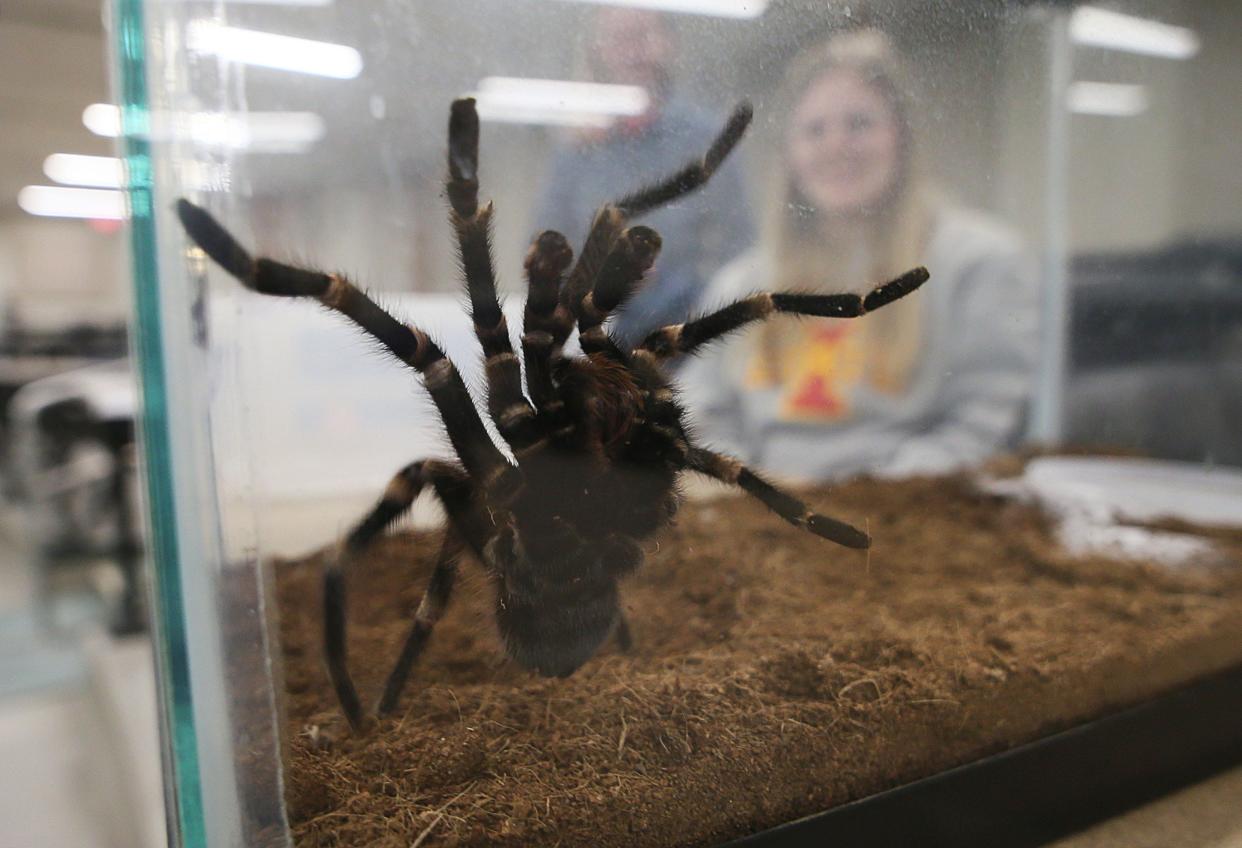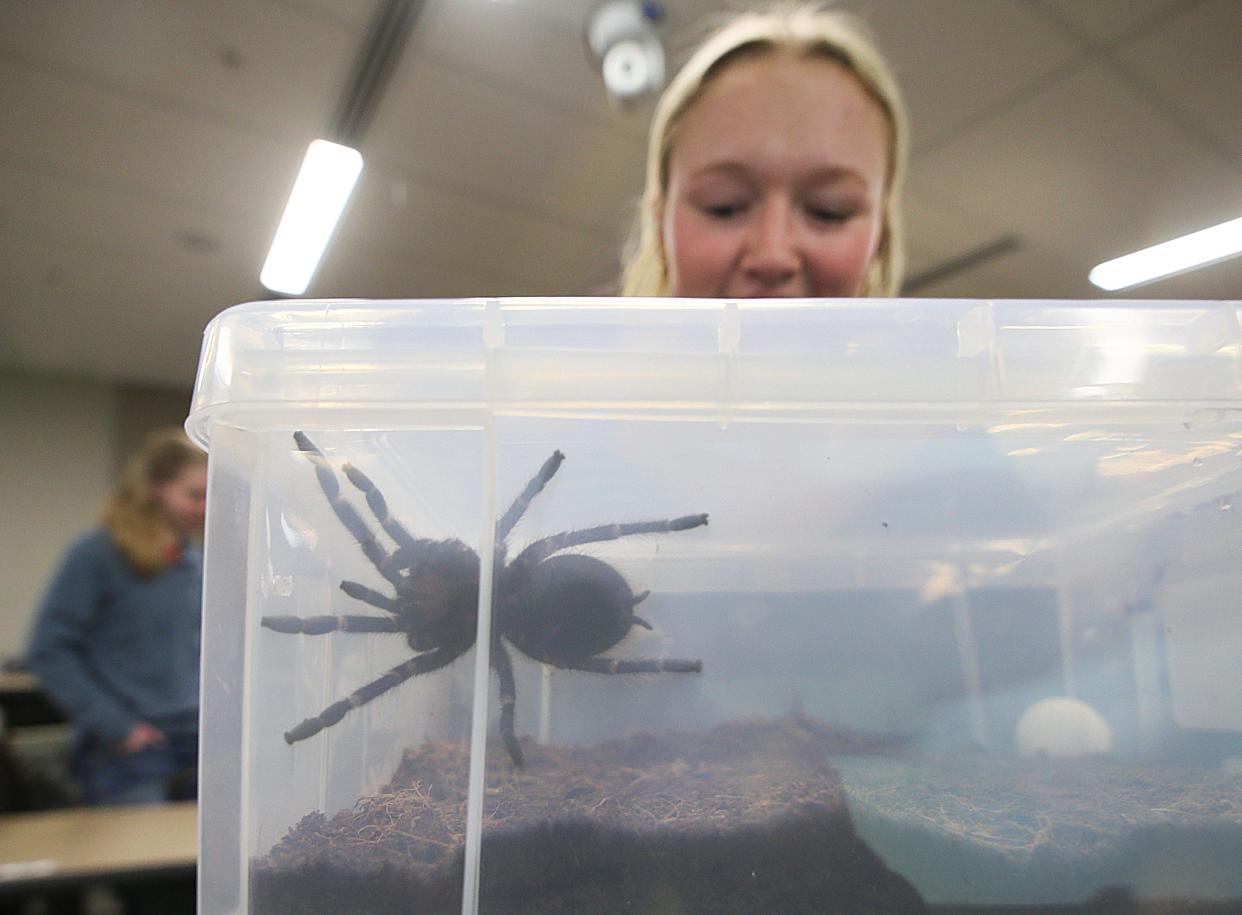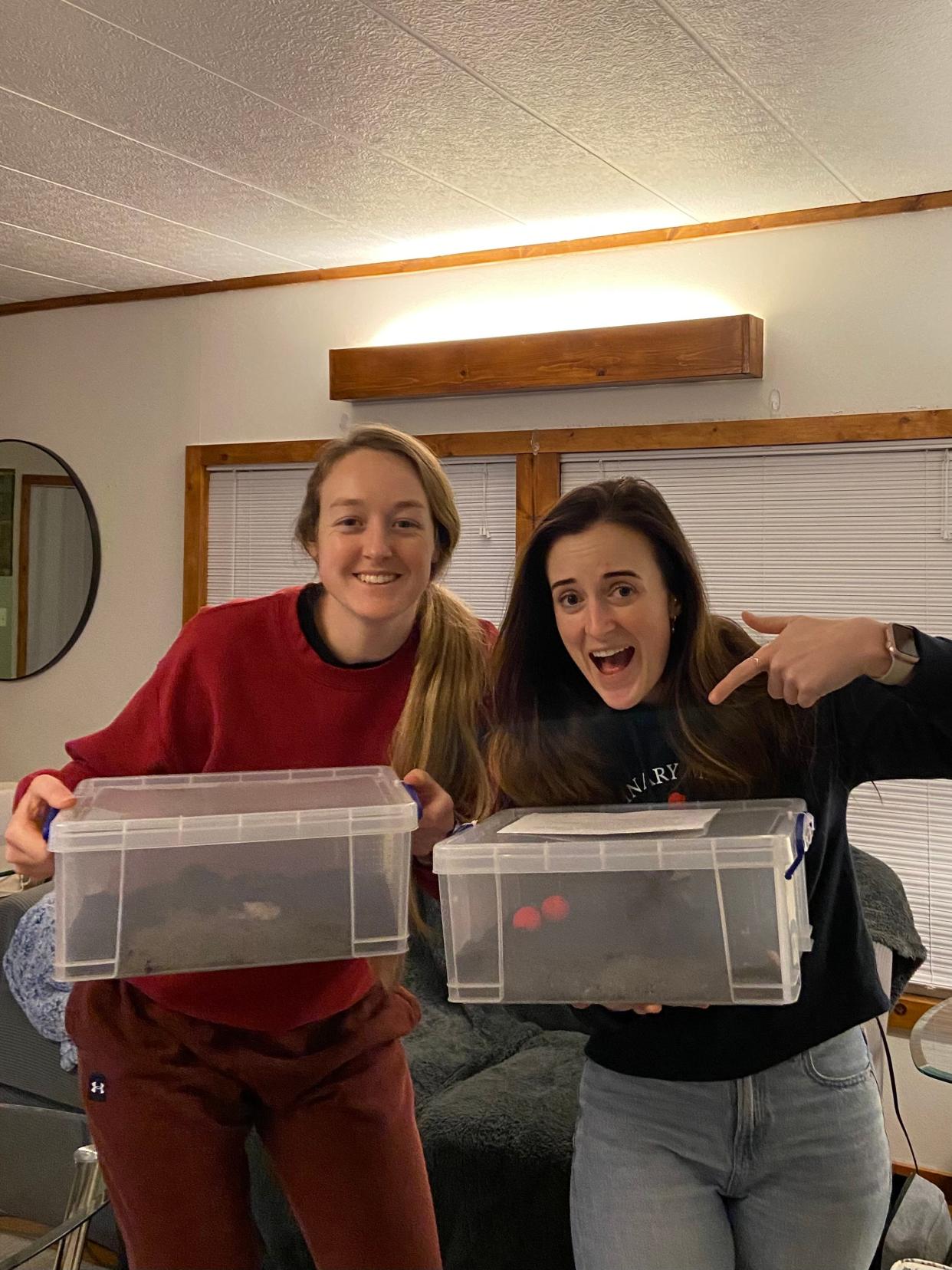Spidey Sense: Reiman Gardens shares tarantulas with ISU Vet Med class
Students in Dr. June Olds' exotic pet medicine class were temporary tarantula caretakers last month.
The Iowa State Vet Med students were responsible for naming their tarantula, feeding them little cockroaches, and generally observing their behavior for the 30-day assignment
Friends as well as classmates, Rachel Ferguson and Molly Eyerly both named their tarantulas Nandor and Lazlo, inspired by the FX show “What We Do in the Shadows.”
Ferguson admits she is "really scared" of spiders, and she didn’t tell her husband she was bringing one home.
“So he was pretty surprised by the whole thing,” she said.
He became an avid spider-sitter, though. He would keep Nandor’s box on his desk as he worked from home during the day while Rachel was at school.
“He’d send me pictures of what he was doing. We got pretty fond of him,” Ferguson said.
More: Story County works on updated Hazard Mitigation Plan to protect against natural disasters
Lazlo and his ping pong ball: Is it play or battle?
Reiman Gardens is well known for its butterfly house, but not many know about their tarantulas.
Reiman lent 33 of its 100 tarantulas to the Iowa State University exotic pet medicine class in February, and students returned their tarantulas on Wednesday, March 6.
Ferguson and Eyerly each had red, round objects in their tarantulas’ homes. The fishing floats and red ping-pong balls stimulated the spiders. One of Eyerly’s videos shows Lazlo on top of his ball, tapping it and rolling to the side.
“He got on it and was scratching it with his fangs," Eyerly said. "He actually interacted with it."
Ferguson also gave Nandor the tube from a toilet paper roll, where he'd crawl in and hide.
“It was exciting when he started playing with his ball and climbing in his toilet paper roll. That was an exciting day,” she said. “It’s terrifying but also kind of cute. Like, a spider is playing with a ball!”
Ferguson said she learned that if the spider puts its leg up at you, it might be annoyed.
It’s the tarantula version of humans putting their hands on their faces.
“He was sassy at times,” Ferguson said.
More: Ames' Reiman Gardens named a Top 10 garden worth traveling for in North America
A busy nocturnal creature
Eyerly’s tarantula was quieter and more active at night, she said, digging holes in the substrate at the bottom of its cage.
Lazlo sat on the end table in the living room so Eyerly could watch him while she studied.
“My cats really liked to look at him, which was super cute,” she said.
Students fed small, live cockroaches to the tarantulas and provided them with water.
Eyerly’s tarantula didn’t eat its cockroach, which survived in the tote with him, which fueled jokes about Lazlo having a pet of his own.
More: Gilbert's Anna Saltzman prevailed in a tight Ames Tribune of the Week vote

Class' tarantulas were not meant for human handling
Each tarantula stayed in their transparent plastic totes during the month-long assignment.
The two species in Reiman Garden's collection are not the type of tarantula that is well-suited for human handling.
“Their hairs are very irritating to people, and they throw their hair at you as a defense mechanism,” Olds said. “If you put your hand in their cage, they’ll kick their body and throw their hair at you. These are a more aggressive species.”
The spiders are not the Chilean rose tarantulas, which are more often kept as exotic pets and handled by humans. The tarantulas in the vet med class were either Brazilian salmon or white knee species. The white knee has white stripes on each of its legs.
More: Ames woman charged for allegedly telling her high school student to fight at middle school


A 'pretty' pet
“The white knee tarantulas are pretty,” said Gabriella Luke, who created a home in a terrarium for her tarantula, which she named Margaret.
The Iowa State students didn’t know the gender of their assigned spiders, though many assigned their temporary pets pronouns and names.
“There were times when I would go to school and when I came home, I’d find that she’d made a huge spider web,” Luke said. “Then she made a ball out of it later on.”
Luke learned that tarantulas sometimes spin these mat-type webs prior to molting, but Margaret didn’t molt under Luke's care.
“It was a great opportunity to learn from it, have it for a month and know how to take care of it,” Luke said. “It’s a good opportunity for veterinary students to learn about a new species in case it comes up in the future.”
Luke's parents, Larry and Teresa Ford, are educators in the Ballard school district. The Ballard graduate is used to interacting with exotic animals.
“My dad’s a science teacher so he’s had geckos, tarantulas, frogs, everything in his classroom for his students to learn about them,” she said. “So I wasn’t uncomfortable with my tarantula and I knew a little bit about them, but after seeing her on my kitchen table for the past month, I’m even more comfortable with them.”

Illegal trafficking of wild tarantulas is a problem
Olds said the assignment taught students about having invertebrates as pets, knowing these animals might someday need a veterinarian’s care.
“We also talk about animals that are trafficked from the wild for the pet trade,” she said. “..... When we talk about the ethics of having these animals as pets, we need to think about where they are coming from."
Law enforcement confiscated all of Reiman Gardens' tarantulas in illegal trafficking cases.
Reiman Gardens’ director of entomology, Nathan Brockman, said they try to educate residents on how to properly and legally obtain tarantulas.
“It’s really hard to know whether a tarantula is a wild-caught individual or captive-reared,” he said. “Captive reared is really what we want the hobby trade to utilize. People (breed) them in captivity, and then that animal is what somebody has as a pet.”

Ames Tribune reporter Ronna Faaborg can be reached at rlawless@gannett.com.
This article originally appeared on Ames Tribune: Iowa State students care for tarantulas in exotic pet medicine study
